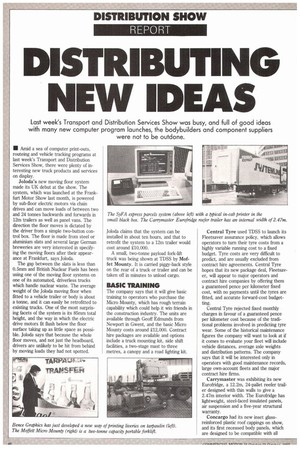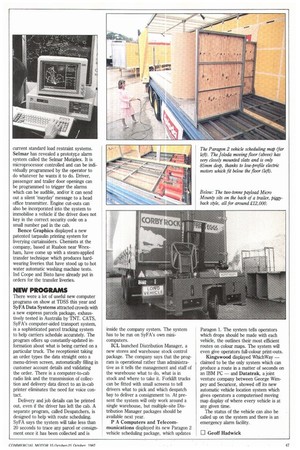DISTRIBUTING NEW IDEAS
Page 48

Page 49

If you've noticed an error in this article please click here to report it so we can fix it.
Last week's Transport and Distribution Services Show was busy, and full of good ideas with many new computer program launches, the bodybuilders and component suppliers were not to be outdone.
• Amid a sea of computer print-outs, routeing and vehicle tracking programs at last week's Transport and Distribution Services Show, there were plenty of interesting new truck products and services on display.
Joloda's new moving floor system made its UK debut at the show. The system, which was launched at the Frankfurt Motor Show last month, is powered by sub-floor electric motors via chain drives and can move loads of between two and 24 tonnes backwards and forwards in 12m trailers as well as panel vans. The direction the floor moves is dictated by the driver from a simple two-button control box. The floor is made from steel or aluminium slats and several large German breweries are very interested in specifying the moving floors after their appearance at Frankfurt, says Joloda.
The gap between the slats is less than 0.5mm and British Nuclear Fuels has been using one of the moving floor systems on one of its automated, driverless trucks which handle nuclear waste. The average weight of the Joloda moving floor when fitted to a vehicle trailer or body is about a tonne, and it can easily be retrofitted to existing trucks. One of the most surprising facets of the system is its 85mm total height, and the way in which the electric drive motors fit flush below the floor surface taking up as little space as possible. Joloda says that because the whole floor moves, and not just the headboard, drivers are unlikely to be hit from behind by moving loads they had not spotted.
Joloda claims that the system can be installed in about ten hours, and that to retrofit the system to a 12m trailer would cost around 210,000.
A small, two-tonne payload fork-lift truck was being shown at TOSS by Moffet Mounty. It is carried piggy-back style on the rear of a truck or trailer and can be taken off in minutes to unload cargo.
BASIC TRAINING
The company says that it will give basic training to operators who purchase the Micro Mounty, which has rough terrain capability which could help it win friends in the construction industry. The units are available through Geoff Edmunds from Newport in Gwent, and the basic Micro Mounty costs around £12,000. Contract hire packages are available and options include a truck mounting kit, side shift facilities, a two-stage mast to three metres, a canopy and a road lighting kit.
Central Tyre used TDSS to launch its Fleetsaver assurance policy, which allows operators to turn their tyre costs from a highly variable running cost to a fixed budget. Tyre costs are very difficult to predict, and are usually excluded from contract hire agreements. Central Tyre hopes that its new package deal, Fleetsaver, will appear to major operators and contract hire companies by offering them a guaranteed pence per kilometer fixed cost, with no payments until the tyres are fitted, and accurate forward-cost budgetting.
Central Tyre rejected fixed monthly charges in favour of a guaranteed pence per kilometer cost because of the traditional problems involved in predicting tyre wear. Some of the historical maintenance figures the company will want to look at if it comes to evaluate your fleet will include vehicle distances, average axle weights and distribution patterns. The company says that it will be interested only in operators with good maintenance records, large own-account fleets and the major contract hire firms.
Carrymaster was exhibiting its new Eurofridge, a 12.2m, 24-pallet reefer trailer designed with thin walls to give a 2.47m interior width. The Eurofridge has lightweight, steel-faced insulated panels, air suspension and a five-year structural warranty.
Concargo had its new inset glassreinforced plastic roof cappings on show, and its first recessed body panels, which are designed to be compatible with all current standard load restraint systems. Selmar has revealed a prototype alarm system called the Selmar Mutiplex. It is microprocessor controlled and can be individually programmed by the operator to do whatever he wants it to do. Driver, passenger and trailer door openings can be programmed to trigger the alarms which can be audible, and/or it can send out a silent 'mayday' message to a head office transmitter. Engine cut-outs can also be incorporated into the system to immobilise a vehicle if the driver does not key in the correct security code on a small number pad in the cab.
Bence Graphics displayed a new patented tarpaulin printing system for liverying curtainsiders. Chemists at the company, based at Ruabon near Wrexham, have come up with a steam-applied transfer technique which produces hardwearing liveries that have stood up to hot water automatic washing machine tests. Ind Coope and Bisto have already put in orders for the transfer liveries.
NEW PROGRAMS
There were a lot of useful new computer programs on show at TDSS this year and SyFA Data Systems attracted crowds with a new express parcels package, exhaustively tested in Australia by TNT. CATS, SyFA's computer-aided transport system, is a sophisticated parcel tracking system to help carriers schedule accurately. The program offers up constantly-updated information about what is being carried on a particular truck. The receptionist taking an order types the data straight onto a menu-driven screen, automatically filling in customer account details and validating the order. There is a computer-to-cab radio link and the transmission of collection and delivery data direct to an in-cab printer eliminates the need for voice contact.
Delivery and job details can be printed out, even if the driver has left the cab. A separate program, called Despatchers, is designed to help with route scheduling. SyFA says the system will take less than 20 seconds to trace any parcel or consignment once it has been collected and is inside the company system. The system has to be run on SyFA's own minicomputers.
ICL launched Distribution Manager, a new stores and warehouse stock control package. The company says that the program is operational rather than administrative as it tells the management and staff of the warehouse what to do, what is in stock and where to take it. Forklift trucks can be fitted with small screens to tell drivers what to pick and which despatch bay to deliver a consignment to. At present the system will only work around a single warehouse, but multiple-site Distribution Manager packages should be available next year.
P A Computers and Telecommunications displayed its new Paragon 2 vehicle scheduling package, which updates Paragon 1. The system tells operators which drops should be made with each vehicle, the outlines their most efficient routes on colour maps. The system will even give operators full-colour print-outs.
Kingswood displayed WhichWay — claimed to be the only system which can produce a route in a matter of seconds on an IBM PC — and Datatrak, a joint venture company between George Wimpey and Securicor, showed off its new automatic vehicle location system which gives operators a computerised moving map display of where every vehicle is at any given time.
The status of the vehicle can also be called up on the system and there is an emergency alarm facility.
D -Geoff Hadwick




































































































